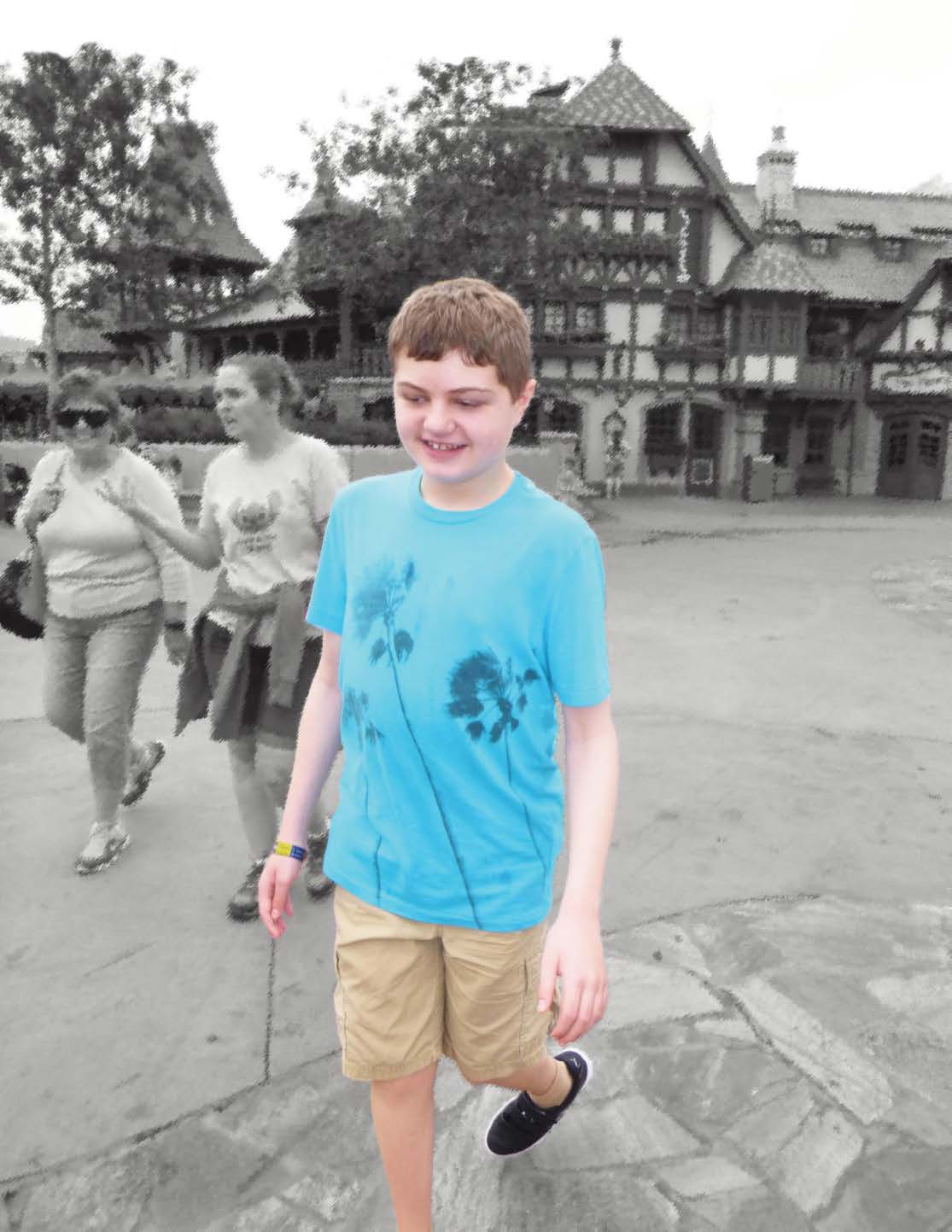
It has been a rough few months with Justin, our severely autistic teenaged son, but even as I'm writing this, I know it could be worse, much worse. In my idle moments (there aren't many, but what woman today has a lot of these) I surf through comments made on Facebook support groups, and despite what's going on with my son I know we're still lucky. In the past few weeks I've read comments by parents who are watching their child's self-injurious behavior and feel helpless. I've read the despair of parents witnessing their son's ramped-up and returned aggression who feel his medication isn't working.
Despite Justin's "spells" or possible seizure episodes, my son is still here, still gracing us with his hugs and smiles multiple times a day, still experiencing joy in his life. No matter what the next few weeks bring with tests and doctors' visits, I still have this.
Although it's difficult to watch him go through these periods where it seems he's no longer connecting to our world, I know as an "autism mommy veteran" that there could be a solution here, that we might be able to find the right combination of meds to make these episodes stop. I also know from watching him cycle through many disturbing behaviors over the years that they might just stop on their own.
The truth is, I can remember a time (well, honestly, there have been several) where I was so overwhelmed I could not conjure up any hope. Going to that dark place didn't help me, and it certainly didn't help my boy, but in the early days of his diagnosis it seemed impossible to feel any other way. At the time we were living hours from any of our relatives and they all worked anyway, and we lived in a state that provided us with only eight hours of therapy a month (!) for our son who had an official autism diagnosis. I immediately got trained in ABA and worked with him thirty hours a week for the next fifteen months until we moved to the haven of New Jersey and its excellent Early Intervention system. There were so many times during that difficult period that I felt I was losing myself, and I wished I'd known some parents with older kids who could give me some advice. And that's why I'm writing today. Whether your child has just been diagnosed, is just starting school, or is struggling through a difficult period, I'd like to share strategies that have worked for me that I wish I'd executed fourteen years ago, not just in recent years. I hope these suggestions help!
ABOUT THE AUTHOR: Kimberlee Rutan McCafferty is a regular contributor to Exceptional Parent. She is also the author of Raising Autism: Surviving the Early Years, a memoir about parenting her two boys, both of whom have autism. Her new book is available on amazon.com
1. If at all possible, I recommend trying to get your son or daughter an appointment with one of Autism Speaks' Autism Treatment Networks. We've been bringing our son to the one in Philadelphia for eight years, and they have been cutting edge with medications and strategies to make his life better. Plus, it's always good to have a second opinion on how your child is doing.
2. If you are the primary caretaker of your autistic child, please make sure you take care of yourself. Strive for a few hours every week. Make those doctor's appointments you've been putting off. Get a sitter so you can have coffee with a friend. It's imperative that you take some time for yourself so you can remain strong for your child. Getting out is good for your health!
3. If you can, join a support group with at least a few other parents with kids your child's age. Parents can be invaluable resources, especially local ones. These connections could prove to be invaluable.
4. Ask for help. 5. Ask for help. 6. Ask for help! Whether it's your neighbor or a friend or a relative, take people up on their offers. Even if they just watch your child so you can run an errand, this break will really help. If you're nervous about leaving your child alone with someone else, have the person offering assistance "shadow" you prior to your leaving him so they can see your routines. People want to help, and while it may take some planning it's important that you build a network of people who can come to your aid when you need it.
7. Plan time for you and your significant other to take a break together (this will be easier if you create that network!) Raising a child with autism has its gifts, but it can also be tough, emotionally and physically, on parents. Get that time together to reconnect if you can.
8. If your school district has a special education PTA, try to join. This is another way to make important contacts and benefit from parents' experiences. Plus, it helps to be surrounded by adults who understand what you're going through.
9. Make friends with other parents whose children have your child's level of autism. I've made friends with parents of children with both severe and mild autism, and while I've benefitted from both connections sometimes I just need to vent to another parent who gets the severe side of the disorder. Make sure you seek out positive people, they are the ones you will benefit from the most!
10. Every night, write down one good thing that happened that day. I will be honest with you, some days it's just been, "He smiled once today." I have found trying to end each day on a positive note, no matter how small, sets me up for a more positive tomorrow. •
GRAND ROUNDS ON IMPROVING HEALTHCARE FOR THE AUTISM COMMUNITY
UCLA'S DAVID GEFFEN SCHOOL OF MEDICINE HOSTS
In Los Angeles, a community outreach program of the David Geffen School of Medicine at UCLA funded a competitive grant, entitled "AutTrain," to create a partnership between the school and the non-profit organization, Autism Society of Los Angeles (ASLA). With a mission to bring awareness of autism, and I/DD in general, to physicians and other health professionals, the grant is headed by Professor and Vice Chair of Medicine, Linda Demer, MD PhD, together with the Government Relations Chair of the ASLA, Judy Mark, their inspiration being their children who are on the autism spectrum. In their experience and the experience of parents in the autism community, many pediatricians have learned about autism and the non-intuitive nature of their medical care, but many internal medicine specialists have not. Since half a million teens with autism will become adults in the next decade, and failure to grasp communication differences in autism can lead to disaster, the need to inform internal medicine specialists is compelling.
Mark and Demer enlisted two experts in TRANSFORMING CARE: (Left to right) Dr. Alicia Abazzano, Dr Rick Rader and Dr. Linda Demer. Dr. Rader's goal was to to inspire physicians to overcome barriers of stigma, to show respect for and to learn practical aspects of caring for patients with autism and I/DD, and to know if, when, and how their care should be handled differently. I/DD health care, Dr. Alice Kuo, Chief of Medicine/Pediatrics at UCLA and Dr. Alicia Bazzano, Chief Physician at the Westside Regional Center and co-founder of the Achievable Clinic. So far, they have hosted workshops for medical students, medical groups, physical therapists, and faculty at the Santa Monica and Westwood campuses. To reach large groups of faculty and young interns and residents, they have hosted local experts to speak at Grand Rounds seminars for clinical departments. For the largest department, they decided to host a national leader in the field, Dr. Rick Rader.
The Grand Rounds event, held on Feb. 21, 2018 began with Dr. Alicia Bazzano providing a brief introduction to the topic of developmental medicine and introducing Dr. Rader. The goal of Dr. Rader's Grand Rounds, held at the Tamkin Auditorium of the Ronald Reagan-UCLA Medical Center, was to convince physicians that knowing how to care for patients with autism and I/DD in general is a "sexy" talent—to inspire them to overcome barriers of stigma, to show respect for these patients, to learn practical aspects of caring for special patients and to know if, when, and how care should be handled differently. The goal would be to reduce stigma and to pique an interest in I/DD among the house staff and faculty -- to encourage them to see their knowledge gaps and to learn more about autism and I/DD in general.
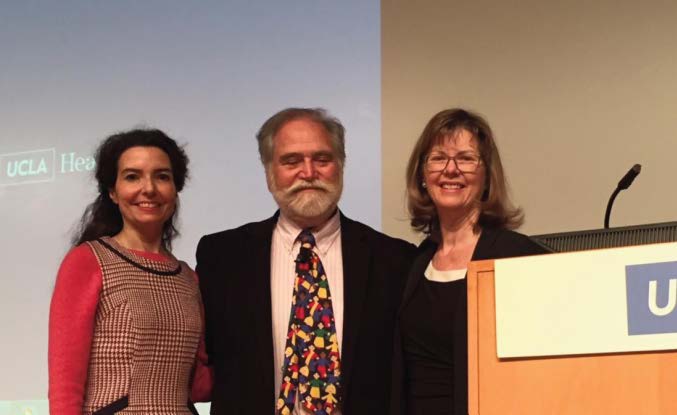
TRANSFORMING CARE: (Left to right) Dr. Alicia Abazzano, Dr Rick Rader and Dr. Linda Demer. Dr. Rader's goal was to to inspire physicians to overcome barriers of stigma, to show respect for and to learn practical aspects of caring for patients with autism and I/DD, and to know if, when, and how their care should be handled differently.
Time will tell whether these goals were realized. We will be watching for inquiries and interest over the next few months. The next step will be to offer lunchtime workshops on campus to provide additional information on these topics to students, residents, nurses, physicians, other health professionals, and staff. Interest and attendance will be a measure of success.
To make the most use of Dr. Rader's visit, Judy Mark, together with the Executive Director of ASLA, Kim Sinclair, hosted an event, by invitation only, at Covell Commons on the north campus of UCLA for leaders from the disability and autism communities of Los Angeles. As a special addition to the event, at the request of his hosts, Dr. Rader was able to arrange to have MILO the robot come along with his handler and successfully demonstrate his ability to engage and interact with a young volunteer with autism. This visit was intended to organize community leaders around the issue of health care and to empower them with information about ways to transform health care for special patients, starting with physician awareness. The consensus among the group was that Dr. Rader was invited to return for another such event to help the community leaders strategize.•
EP's Innovative New Digital Strategy
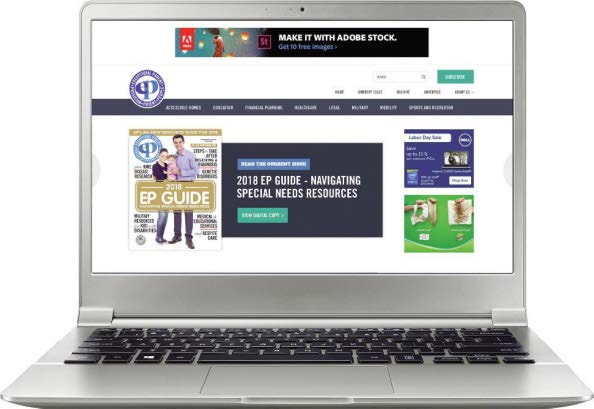
Exceptional Parent Magazine is proud to announce the launch of ep-magazine.com – our all new website which coincides with our expanding role as a leader in the field of special needs publishing and communications.
ep-magazine.com now features a bold new design and intuitive site-wide navigation system with improved menu functionality that directs you to the information most relevant to you. It is also fully responsive with mobile devices, making it easy to navigate on a wide range of web browsers and portable devices.
We've introduced a range of new content to the website, including In This Issue that highlights selected content from our latest issue, and From Our Contributors, which features the most recent offerings from regulars such as Genetic Alliance and the AADMD.
Our eNewsletter is the latest innovation in our digital strategy, enabling you to sign up for updates right on the homepage, and access the articles that matter to you each and every week. We also plan to continue adding more video content and product information to provide you with all of the resources you need to care and plan for your loved one with special needs.
We're really proud of the new website and feel it will create the experience you're looking for when you pay us a visit. Check it out here: ep-magazine.com

ADVERTISERS: Reach a growing audience on EP's all-new website and strategically target your consumers. Our competitive advertising rates offer top-quality results for an excellent value. Our team of designers and developers are ready to create digital marketing campaigns that effectively communicate your brand's message to our dedicated online audience. CONTACT: Faye Simon at fsimon@ep-magazine.com
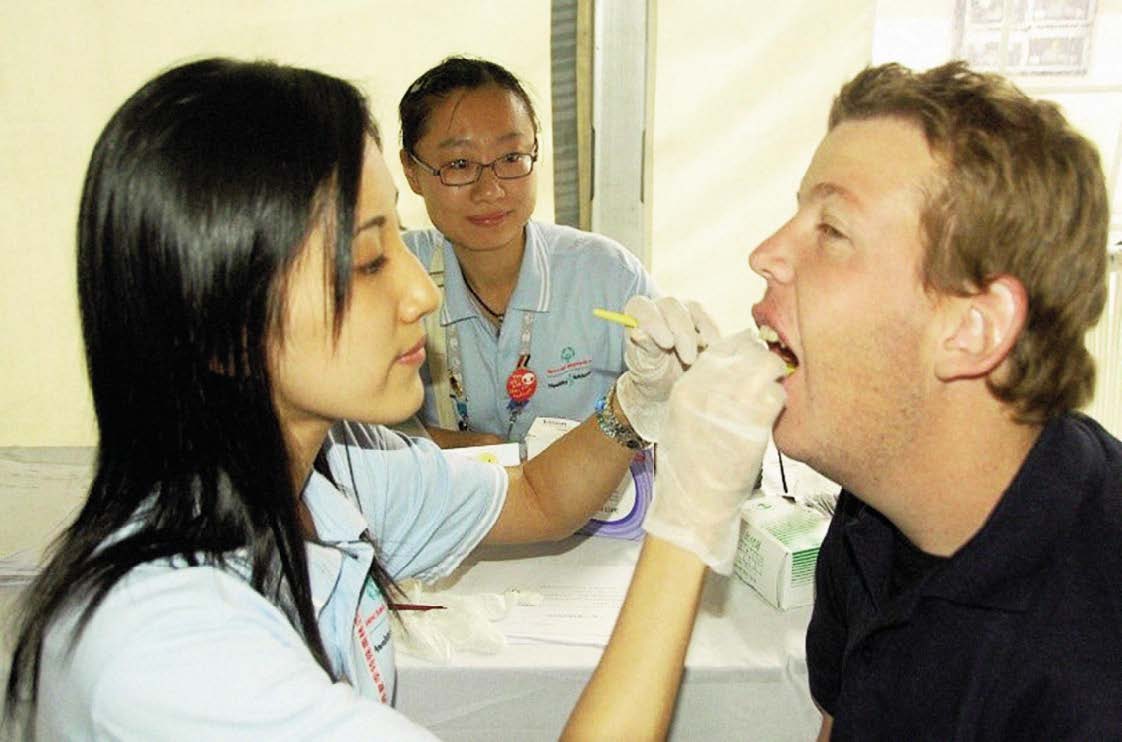
ADDRESSING THE ORAL HEALTH CRISIS IN THE U.S. AND ABROAD
It's no secret, there is an oral health crisis here in the United States and around the globe. While our oral health is directly linked to our overall health status, it is unfortunately not always prioritized. The World Dental Federation even used the slogan "Think Mouth, Think Health" for 2018's World Oral Health Day, suggesting that a healthy mouth means a healthy body. The U.S. Department of Health and Human Services (HHS) has also placed emphasis on reducing oral health disparities outlined in their Oral Health Strategic Framework 20142017 and HHS also echoes the World Dental Federation by stating "total health and wellness cannot exist without oral health."
Research has also shown that disparities in oral health largely impact the overall health and quality of life of an individual. The surgeon general's 2000 Oral Health Report referred to the oral health issues plaguing children and adults across the United States as the "silent epidemic." Poor oral health can alter our appearance, speech, our eating habits and even our social and emotional wellbeing, and also contributes to school and work absenteeism.
So why aren't we prioritizing oral health more? Some studies show that since oral health traditionally had been isolated and not included as an integral part of overall health, there's been a lack of priority placed on oral health prevention. Other contributing factors to poor oral health include cost of dental health services and access to providers. These barriers to care are preventing most people from improving their oral health, but more specifically, vulnerable populations like children and adults with disabilities.
Data has commonly shown the disparities in health status for children and adults with intellectual disabilities (ID) and in the areas of oral health this holds true as well. There are a few reasons why there is a gap in accessing oral health for people with ID. Cost in obtaining dental services is a barrier for close to 29% of people with disabilities, many of whom in the U.S. depend upon Medicaid for these services.
How is Special Smiles Addressing the Oral Health Care Crisis?
Since 1997, the Special Olympics Special Smiles program founded by Dr. Steve Perlman has been helping to address oral health issues for children and adults with intellectual disabilities. Special Smiles provides screening opportunities not only for Special Olympics athletes, but also other children and adults with intellectual disabilities within their local communities across the globe during Healthy Athletes Screening events.
Special Smiles also trains oral health professionals and equips them with the skills to treat people with intellectual disabilities through a Train-the-Trainer program facilitated by an experienced oral health professional. During the Train-theTrainer sessions, some of the common health issues that affect the ID population are discussed, oral health professionals are trained on the Centers for Disease Control and Preventions standardized screening
protocols during the didactic session, and then there's the hands-on opportunity that allows dentists to work with children and adults with ID. Special Smiles Train-theTrainer opportunities are available to oral health professionals in the U.S. and internationally and have helped to break down barriers in care by creating exposure and increased knowledge.
Special Olympics data from Train-theTrainer events also indicate that most clinical volunteers in Special Smiles have not had the opportunity to learn about treating the ID population while attending dental or
dental hygiene schools, which plays into how people with ID are not able to access appropriate care or are often turned away by potential providers. We are also beginning to see a change within the dental student population who make up Special Smile's largest volunteer base. Connecting with dental schools has created earlier exposure to the ID community as well as engaged student groups that are focused on serving this population. The American Academy of Developmental Medicine and Dentistry (AADMD) has been instrumental in this process by creating student chapters who are passionate about improving the health status of people with ID.
Special Olympics is also facilitating improved oral health here in the United States by creating partnerships with nonprofit organizations like The National Children's Oral Health Foundation (NCOHF) (ncohf.org/whoweare) that pro vides resources to help navigate dental health services, works with nonprofit dental service providers, and helps to improve the oral health status of underserved children here in the U.S. Under the recent leadership of NCOHF's executive Director Jill Malmgren, Special Smiles has been able to be creative in our approach to improve and promote oral health among children participating in Special Olympics through our joint goals of emphasizing prevention and oral health education. In addition to nonprofit partnerships we have had a long-lasting partnership with Colgate, a leader in oral health education that's been equipping our athletes with oral health products like toothpaste and toothbrushes during Special Smiles Screenings here in the US and abroad for over 20 years. We are continuing to explore with Colgate how we can continue to address the oral health issues that are prevalent within the ID population. Around the globe some of our most impactful stories are aligned with connecting people with ID to dental care services. In India, where over 80% of children under the age of 15 have tooth decay, Dr. Reena Kumar—who is Special Smiles Regional Clinical Advisor and Dean of Divya Jyoti College of Dental Sciences & Research in Uttar Pradesh-- approached the Dental Council of India and appealed to mandate all dental schools to provide Special Olympic Athletes free dental care countrywide. Because of Dr. Kumar's request, the president of the Dental Council of India and the executive committee members issued a directive to over 300 dental colleges in India to provide free treatment to athletes of Special Olympics Bharat. This bold move has now unlocked oral health care for many Special Olympics Athletes in India who may not have otherwise been able to access this care that impacts their overall wellbeing.
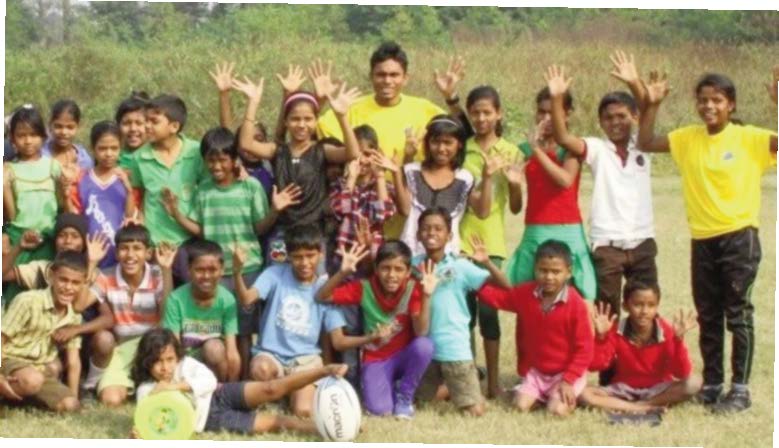

THEIR ORAL HEALTH IS IN THEIR HANDS: (Above left) Due to the programs intoduced at the Special Olympics Bharat, athletes will now have access to dental care throughout India. (Above right) In Thailand, Varaya no longer has to live with excruciating pain in her mouth thanks to Special Olympics.
In a Special Olympic Healthy Communities program in Thailand, Varaya, a 14-year-old student from a special school, had been receiving health screenings, which identified her tooth decay. Through a local partnership between her school and the healthcare agency in her providence, she was able to have dental treatment and ultimately, a tooth extracted, which caused her so much pain. Financial barriers prevented her parents from taking her to a dentist to have her screened. Without the screening conducted at her school through Healthy Communities, this oral health problem could have exasperated into more serious health problems.
Another story that continues to have impact is the story of Dustin Plunkett, an athlete here in the United States who had many oral health issues, including consistent gum swelling. He was referred to seek additional care following a Special Smiles Screening that indicated serious problems with his teeth and gums. Further examination uncovered oral cancer and Dustin underwent lifesaving surgery to remove the cancer and has been cancer- free ever since. These are just a few of the stories that show how Special Smiles is creating linkages to care, raising professional awareness and other strategies that are not only cost saving, but lifesaving as well.
What Can Parents and Caregivers do to Improve Oral Health Care for Their Children?
As a parent, navigating health care services for youur child can be tricky even if you are not a developing country. Specifically, when trying to access health care for a child with ID, other issues often become priority, and oral health care can become an afterthought. Parents and caregivers of children with ID must be proactive when it comes to preventative oral health care at home and connecting their children to dental services because of the additional barriers in place. Parents and caregivers also play a vital role in their children's oral health by reinforcing good oral health habits as well. Nadia Hamilton
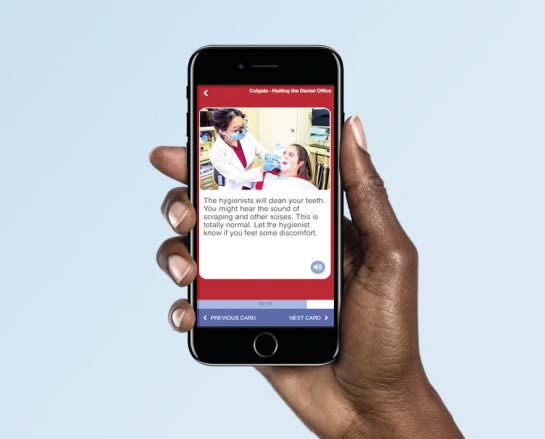
FACE CARD: Nadia Hamilton developed MagnuCards to explain the standard protocols during a visit to a dentist, and to improve life skills in hygiene and oral health.
and her brother Troy, who is autistic, experienced many challenges while trying to be proactive in maintaining good oral health practices both in home prevention care as well as regular dental checkups with an oral health professional. At home Troy would have to rely on his parents to help him brush and floss his teeth two times a day to help maintain good oral health, which caused a level of dependency. Outside of the home, dental health service providers also proved hard to find with dental health care being privatized, meaning Canadians, like Troy and Nadia, pay for dental services through insurance, or they pay out of pocket even though Canada has a universal health care system. Nadia went from dentist to dentist trying to find the right dental provider and even after finding the right provider she noticed an additional barrier, it was hard for many people with ID, including her brother, to manage any difficulties that may occur during a dental visit. To address some of these issues, Nadia launched an app in 2015, MagnuCards (magnusmode.com), that has 12 life skills categories providing people with ID step-by-step visual and audio instructions for day-to-day task and even categories to improve in areas like hygiene and oral health. Colgate, the oral health partner of MagnusCards, developed the oral care platform that teaches and reinforces good oral health behaviors that a parent may not always be able to do, and even guides the user on a dental office visit and what one should expect during the visit. Innovators like Nadia, and partners like Colgate, are helping Special Olympics see how we can best support families in seeking oral health care prevention and care for children and adults with ID.
S pecial Olympics Special Smiles is continuously looking at ways to support parents and caregivers by providing resources like A Caregivers Guide to Good Oral Health for Persons with Special Needs and developing partnerships with advocacy groups and corporate partners to close the gap in care. Additionally, Special Smiles will be developing more resources to promote improved oral health and will continue creating opportunities for oral health care professionals to be trained to help improve the health status of children and adults with ID to help keep oral health a priority in overall wellbeing.•